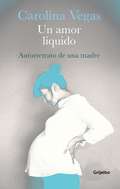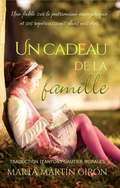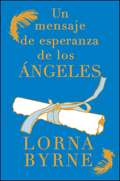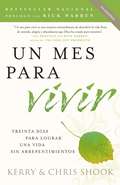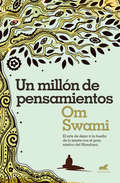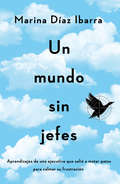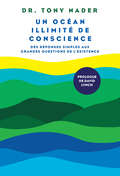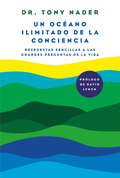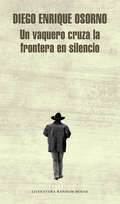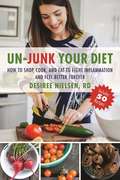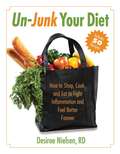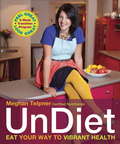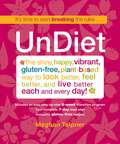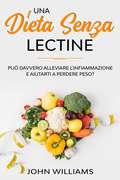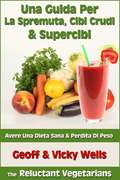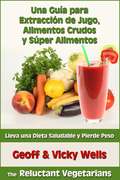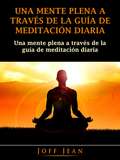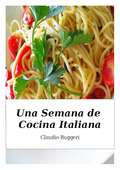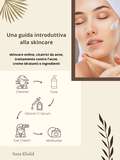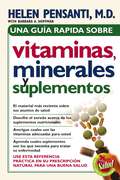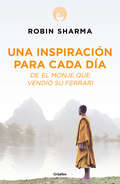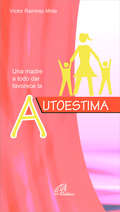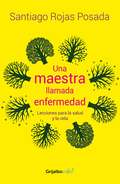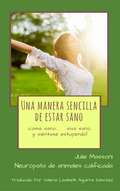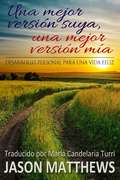- Table View
- List View
Un amor líquido: Autorretrato de una madre
by Carolina Vegas MolinaEl diario de vida de una mamá primeriza que narra los detalles de un cambio de vida inminente. Dar a luz representa un instante luminoso en la vida de muchas mujeres; sin embargo, ¿qué ocurre cuando no todo es así? Este es el conmovedor testimonio de una madre que cuenta aquello de lo que nunca nadie habla. Paso a paso, delinea el camino que inició desde que descubrió que estaba embarazada, hasta que tuvo a su hijo y empezó a recorrer la vida de la mano de ese nuevo ser, que también era ella. Con humor, ironía y trazos infinitos de realidad, Un amor líquido reconstruye el papel de la madre, del padre, de los abuelos y de todo lo que rodea este maravilloso acontecimiento.
Un cadeau de la famille
by Marta Martín GirónLe premier roman qui traite des répercussions de notre héritage énergétique Très souvent il nous arrive des choses que nous ne savons expliquer, des situations qui nous font souffrir parce que nous ne les comprenons pas. Nous en arrivons même à accuser le destin de notre malheur ou notre tristesse, de notre maladie ou celle d'un être cher, de nos carences ou limitations. Mais, que se passerait-il si tout cela était un cadeau qui se transmet de génération en génération pour soigner quelqu'un d'autre pour nos ancêtres ? Que se passerait-il si nos expériences étaient le fruit d'expériences passées, de notre mémoire transgénérationnelle ? Que se passerait-il si les troubles physiques apportaient un message qui peut être biodécodé ? Que se passerait-il si nous devenions conscient de toutes ces expériences et si nous soignions nos problèmes? Nous sentirions-nous libres ? Récupérerions-nous notre santé ? Reconduirions-nous notre chemin et trouverions-nous de nouveaux objectifs ? Ce livre est basé sur une histoire réelle, sur les expériences de l'auteure elle-même par rapport aux circonstances de sa vie qu'elle ne réussissait pas à comprendre mais dont elle savait qu'elles n'étaient pas fortuites. Avec elle, vous pourrez voir comment elle a avancé sur un chemin que jamais elle n'aurait imaginé, entourée et conditionnée par les influences des schémas hérités de l'énergie ancestrale de son clan.
Un mensaje de esperanza de los ángeles
by Lorna Byrne"Hay muchos ángeles que sostienen lámparas deluz frente a las personas, para darles ánimo. Vivimos tiempos difíciles y retadores, pero hay muchas razones para tener esperanzas y en este libro transmito este mensaje". --Lorna Byrne Lorna Byrne ve a los ángeles con tanta claridad como el resto de nosotros ve a las personas, y les habla todos los días. En Un mensaje de esperanza de los Ángeles Lorna nos reconforta al hacernos ver que por solitarios que podamos sentirnos, siempre tenemos un ángel guardián junto a nosotros para apoyarnos en los retos que diariamente afrontamos. En este libro que nos inspira y alienta, Lorna revela cómo podemos pedir ayuda a nuestros ángeles para que nos guíen a superar los retos que todos debemos hacer frente inevitablemente, como la soledad, la depresión, el estrés, las preocupaciones económicas, las penas, la muerte de un ser querido o la sensación de sentirse inadecuado como padres. No importa los obstáculos que debamos sortear, todos podemos pedir el apoyo de los ángeles para traer más felicidad y realización a nuestras vidas.
Un mes para vivir: Treinta Días Para Lograr Una Vida Sin Arrepentimientos
by Kerry Shook¿Qué pasaría si sólo te quedara un mes de vida? ¿Cómo conseguirías que cada día importara de verdad? ¿Qué empezarías o dejarías de hacer? ¿Cómo te relacionarías con los demás? Un mes para vivir te da los instrumentos para concentrarte y ser tal como Dios te creó: apasionado, plenamente vivo y sin remordimientos.En Un mes para vivir aprenderás los cuatro principios para vivir una vida sin remordimientos:VIVIR APASIONADAMENTEViviendo cada día como si fuera el últimoAMAR PLENAMENTEDemostrando a los demás que el amor trasciende y transformaAPRENDER HUMILDEMENTE Aprendiendo a través de tus problemas y del dolorPARTIR AUDAZMENTECreando una herencia que dejará huella durante generacionesUn mes para vivir explora los principios universales y plantea preguntas para que reflexiones y para ayudarte a analizar los aspectos fundamentales de tu vida. Cada uno de los treinta capítulos uno por cada día de un mes que te cambiará la vida te ofrece estrategias y herramientas novedosas para ayudarte a vivir la vida para la que fuiste creado.
Un millón de pensamientos
by Om SwamiAprende a meditar de la mano del místico del Himalaya convertido en best seller en la India, con 100.000 lectores. El yogui indio que lo dejó todo, y vendió literalmente su Porsche, para irse a meditar 22 horas al día durante 13 meses seguidos en el Himalaya. Om Swami es el aclamado yogui indio que lo dejó todo para irse a meditar 22 horas al día durante 13 meses seguidos en las cuevas y los bosques del Himalaya. Tras miles de horas de intensa meditación en completa soledad, hoy nos ofrece una guía única para aprender a meditar, canalizar pensamientos inútiles y convertirlos en energía productiva. De su mano, aprenderemos cómo meditar correctamente en varios estilos y cómo dominar muchas prácticas yóguicas que nos conducirán a la máxima autorrealización espiritual. Convertido en best seller en la India, Un millón de pensamientos es un libro necesario para el lector moderno que quiere dominar el arte de la meditación. «Cada uno de nosotros es un maestro con infinitas posibilidades a escala universal. La meditación nos ayudará a cumplir nuestro verdadero potencial.»Om Swami
Un mundo sin jefes: Aprendizajes de una ejecutiva que salió a matar patos para calmar su frustración
by Marina Díaz IbarraCon humor cautivante y honestidad brutal, la autora desmenuza su derrotero profesional. Y revela qué aprendió en el camino para poder sortear la pandemia de apatía laboral de nuestra época y recuperar las ganas de comerse el mundo. ¿Sabías que a la gran mayoría de la gente no le gusta (o simplemente detesta) su trabajo? ¿Y que casi el 90% de aquellos que dejan sus empleos lo hacen a causa de la relación con su superior directo? ¿Es que hay una epidemia de jefes sádicos torturando a empleados abnegados ahí afuera? Esta es la historia de cómo, después de cruzarse con jefes y jefas "horribles", de vivir escenas de oficina que ruborizarían al Marqués de Sade, de atravesar noches de angustia sin poder pegar un ojo y de reprimir las ganas de salir a matar patos con una escopeta, la autora, desde la cúspide de la pirámide corporativa y atrapada en el famoso "desastre disfrazado de éxito", pudo patear el tablero y delinear un proyecto propio que la realizaba. Experta en disrupción digital, directora independiente en varios boards, inversora y meditadora, Marina cuenta, con humor cautivante y honestidad brutal, cómo fue su derrotero profesional, por qué eligió la metáfora de los patos para hablar de los miedos y prejuicios que no nos dejan salir a "volar", y qué aprendió en el camino para poder sortear la pandemia de apatía laboral de nuestra época y recuperar las ganas de comerse el mundo. • Por qué una vida escindida es una vida en crisis• Cómo están diseñados los buenos líderes• Estadísticas y estudios sobre desmotivación laboral (y algunas claves para sentir motivación)• Por qué hay tantas mujeres y hombres sintiendo que sus trabajos son un castigo... • De qué modo un buen equipo brinda seguridad interna Un libro sobre la vida corporativa, la autoridad y los jefes; sobre el dolor de los fracasos, el cambio y la huida de la inercia; sobre el despertar y la ambición de inventarnos. Y sobre la motivación y la capacidad que todos y todas tenemos de convertirnos en quienes anhelamos ser.
Un océan illimité de conscience
by Dr. Tony NaderDes réponses simples aux grandes questions de l'existence. Prologue de David Lynch. «Dans ce livre qui fera date, les idées que développe le Dr Nader ont le pouvoir de changer le monde. Il apporte des réponses fondamentales aux questions qui ont fasciné et intrigué depuis longtemps philosophes et scientifiques. Qu'est-ce que la conscience, sommes-nous libres ? Comment réussir au mieux sa vie, réaliser ses désirs, susciter la paix et l'harmonie entre les êtres humains et les pays ? À toutes ces questions, il apporte des solutions fondées sur un paradigme fondamental et simple qui unifie l'esprit, le corps et l'environnement en un océan unique d'Être pur, de conscience pure. Un livre que toute personne à la recherche de la vérité ultime et absolue se doit de lire.»David Lynch «Je veux que toute le monde sache ce qu'est la conscience et comment la développer pour profiter du plein potentiel de la vie individuelle et sociale.»Dr. Tony Nader
Un océano ilimitado de la conciencia: Respuestas sencillas a las grandes preguntas de la vida
by Dr. Tony NaderFigura central de las fundaciones David Lynch y Maharishi, neurocientífico graduado en Harvard, reconocido erudito védico y referente mundial de la Meditación Trascendental™, el Dr. Tony Nader formula en este libro una serie de preguntas existenciales fundamentales (¿cuál es nuestro propósito en la vida?, ¿tenemos verdadero control sobre nuestros destinos?) y, a través del estudio de la Conciencia, nos acerca respuestas con beneficios prácticos que aspiran a darnos esclarecimiento, paz y plenitud. «En este libro histórico, el Dr. Tony Nader presenta ideas que pueden cambiar el mundo. Propone soluciones profundas a preguntas que han fascinado e intrigado durante mucho tiempo a filósofos y científicos. ¿Qué es la Conciencia, tenemos libertad? ¿Cómo sacar lo mejor de la vida, cumplir los deseos y crear paz y armonía entre los pueblos y las naciones? Ofrece estas soluciones, basadas en un paradigma subyacente simple, que unifica la mente, el cuerpo y el medio ambiente en un océano de Ser puro, Conciencia Pura. Una lectura obligada para cualquier buscador de respuestas a los misterios de la vida, a la verdad absoluta y última.» David Lynch «Quiero que todos sepan qué es la Conciencia y cómo desarrollarla para disfrutar de todo el potencial de la vida individual y social.» DR. Tony Nader ¿Hay algún propósito oculto en la vida, un diseño secreto, una lógica significativa, un objetivo que alcanzar? ¿De dónde venimos y adónde vamos después de irnos? ¿Por qué deberíamos estar luchando? ¿Podemos elegir? ¿Somos libres o esclavos del destino, de las leyes de la naturaleza o de Dios? Como seres conscientes que desean tomar el control de sus vidas, estas preguntas son fundamentales; y todos terminan haciendo suposiciones o suscribiéndose firmemente a las creencias sobre muchas de ellas. Esas convicciones se convierten en nuestra subyacente "visión del mundo" que influye en todo lo que hacemos. Me volqué al estudio de la medicina, la psiquiatría y la neurología para comprender por qué, si bien somos tan similares, podemos ser tan diferentes en nuestras opiniones, mentalidad y puntos de vista. Pero las respuestas a mis preguntas fundamentales eran demasiado complejas y abstractas para la investigación científica. Fue la Meditación Trascendental™ lo que me permitió explorarlas a través de la experiencia directa, en lugar del análisis y la deducción. Este libro está dedicado a todos los buscadores de conocimiento, científicos, filósofos, maestros, líderes sabios y guías que investigan los secretos del funcionamiento de la naturaleza y el esfuerzo por mejorar la vida en la Tierra.
Un vaquero cruza la frontera en silencio
by Diego Enrique OsornoEn tiempos de Donald Trump, ésta es una defensa de la vida común y humilde entre Estados Unidos y México Gerónimo González Garza cruzó la frontera de México con Estados Unidos por primera vez en 1969. Desde entonces y hasta principios de los noventa, cuando finalmente se asentó legalmente en Texas, con su esposa e hijos, llevó una vida nómada. En Estados Unidos encontró oportunidades que nunca tuvo en su país. También encontró su voz. Como un sordomudo que no ha aprendido el lenguaje de señas, la frontera noreste del país carece de un lenguaje propio en estos tiempos de guerra. Y sin lenguaje, el pensamiento y la libertad se desvanecen. La crítica ha opinado: "Diego Enrique Osorno encuentra una poderosa metáfora para esa parte de México donde sencillamente hoy no se puede hablar." -Hermann Bellinghausen- "Una novela muy mexicana escrita por uno de los talentos del Nuevo Periodismo Latinoamericano, un testigo de las matanzas a las orillas del río Bravo, entre cactus, caballos, rebaños de ganado, armas cargadas y asesinos que dictan la ley." -La Repubblica (Italia)- "En la crónica lo que pudo haber sido una existencia anodina, el autor lo transforma en relato épico. Osorno sigue la tradición de los poetas infrarrealistas, de Bolaño y sus detectives salvajes." -Alejandro Saldívar-
Un-Junk Your Diet: How to Shop, Cook, and Eat to Fight Inflammation and Feel Better Forever
by Desiree NielsenWe don’t need to be instructed to eat apples instead of potato chips. What we need is someone to inspire us to eat well and to show us just how powerful eating that apple can be. This person must be a trusted voice, one that can calm the informational clutter instead of adding yet another discordant voice to the pile. <p><p> Desiree Nielsen is a registered dietitian, one of the public’s most trusted sources of nutrition information. In Un-Junk Your Diet, she teaches readers about anti-inflammatory dieting in a way that’s engaging, funny, and approachable. <p> This book begins with a call to action to help shake up perceptions of what food means to our bodies and illuminate all the ways that marketers co-opt healthy eating messages to coerce us into choosing food that is unworthy. In addition, an in-depth look at the fundamentals of nutrition-with a splash of myth busting-strengthens readers’ abilities to resist the latest nutrition headline and continue making healthier choices. <p> Because there is no one right way for every individual eater, Nielsen offers a brief exercise in self-discovery before providing four distinct plans for becoming healthier. They range from the gentle and gradual to the two-week kick start that appeals to both detox seekers and vacation slimmers.
Un-Junk Your Diet: How to Shop, Cook, and Eat to Fight Inflammation and Feel Better Forever
by R.D. Desiree NielsenPeople don't need to be instructed to eat apples instead of potato chips. What we need is someone to inspire us to eat well and to show us just how powerful eating that apple can be. This person must be a trusted voice, one that can calm the informational clutter instead of adding yet another discordant voice to the pile.Desiree Nielsen is a dietitian, one of the public's most trusted sources of nutrition information. Un-Junk Your Diet, she teaches readers about anti-inflammatory dieting in a way that's engaging, funny, and approachable.This book begins with a call to action to help shake up perceptions of what food means to our bodies and illuminate all the ways that marketers co-opt healthy eating messages to coerce us into choosing food that is unworthy. In addition, an in-depth look at the fundamentals of nutrition--with a splash of myth busting--strengthens readers' abilities to resist the latest nutrition headline and continue making healthier choices.Because there is no one right way for every individual eater, Nielsen offers a brief exercise in self-discovery before providing four distinct plans for becoming healthier. They range from the gentle and gradual to the two-week kick start that appeals to both detox seekers and vacation slimmers.
UnDiet
by Meghan TelpnerA toolbox for a complete lifestyle transformation -- from a holistic nutritionist with an inspiring and practical message. Is it possible to look and feel your absolute best while eating the most delicious food and avoiding the trap of diet deprivation and calorie counting? Meghan Telpner's UnDiet reimagines the way we look at our health and our ability to change it. Infused with her signature humor, enthusiasm, and accessibility, Meghan inspires readers to question paradigms; take ownership over their health; and join her in reinventing their lives, one small change at a time. UnDiet offers a motivating lifestyle makeover that is more fun than any other diet -- with lifelong, life-changing results. Featuring: * Practical nutrition information * 40 easy and delectable gluten-free recipes * Comprehensive meal plan * Complete 8-week transition program * Lifestyle advice from a posse of experts joy. In an accessible, light, and encouraging voice, Meghan takes readers through a program that will transform their lives, small change by small change, and without the word "diet." UnDiet is a lifestyle manual that challenges and reimagines the accepted notions and ideas for healthy living. From the Trade Paperback edition.
UnDiet: The Shiny, Happy, Vibrant, Gluten-Free, Plant-Based Way To Look Better, Feel Better, And Live Better Each And Every Day!
by Meghan TelpnerA fabulous, practical, and modern guide to true health from a fresh and engaging certified nutritionist with an inspiring and transformational message. Without ever using the word &“diet,&” Meghan Telpner encourages readers to make major life changes small step by small step with help from the latest nutritional science, a fun and encouraging voice, and an &“abundance mindset.&” Ideal for those seeking a gluten-free, plant-based meal plan and an accessible path to health.UnDiet answers the question many people have when they realize it&’s time for a change in their diets, a change in their health, and a change in their lives: Where do I start? Without being too far off the mainstream, this book offers a simple, attainable, and most importantly, maintainable approach to living life well. With her strong, appealing personality, Telpner guides readers toward optimal gluten-free health by incorporating simple lifestyle modifications. Information is explained with refreshing clarity and vibrant passion, making it easy to follow ideas right off the book's brightly designed pages and into everyday life.When Meghan was diagnosed with Crohn&’s disease at age 26, and told her incurable condition could only be treated with surgery and a lifetime of medication, this wellness warrior gave up her career in advertising and her gym membership, and instead began practicing yoga, making smart nutritional modifications, and adding awesome herbal remedies into her life. Within four weeks she was completely symptom-free, and remains so six years after her diagnosis. Now a certified nutritionist who shares her knowledge via online courses and videos with a dedicated following around the world, Meghan offers a lifestyle based not on deprivation and painful restrictions, but vitality, mindfulness, and joy. With her help, we soon discover how our level of health and happiness is our own responsibility and the grand missing component of total health is our attitude. When we raise the bar of how we care for and think of ourselves, that standard gets raised in all aspects of our lives. Eat your way to the life of your dreams!Includes a plan for an 8-week transformation and more than 35 delicious gluten-free, plant-based recipes.
Una Dieta Senza Lectine: Può Davvero Aiutarti Con L'Infiammmazione e Con La Perdita di Peso?
by John WilliamsStai soffrendo di permeabilità intestinale? Senti spesso un'infiammazione nel tuo corpo? Qualunque cosa mangi sembra darti problemi? Potrebbe la lectina essere la causa dei tuoi problemi? Una cattiva digestione potrebbe rovinarti un'intera giornata e potrebbe trasformarti da super-efficiente a totalmente inefficiente. Una costante infiammazione e una sensazione di inquietudine lungo il tuo intestino potrebbero essere il peggiore dei tuoi incubi. La cosa peggiore è che non ti rendi conto quale sia il tuo problema! Cosa ci dovresti fare? Le persone offrono molti consigli, consigli che per loro hanno funzionato, e anche se ci provi, non sembra funzionino anche con te, e non sai il perché? Il motivo è semplice: una dieta che ha funzionato per qualcun altro non per forza può funzionare con te! Le persone son tutte diverse e ogni corpo reagisce in modo diverso a diverse cose commestibili. Ottieni una dieta che funzioni per te! Se potessi avere una diete che funzioni perfettamente per te, tutti i tuoi problemi sarebbero risolti, giusto? Vuoi vedere come posso esserti d'aiuto? Cura l'infiammazione costante Cura la sindrome dell'intestino irritabile Cura la sindrome della permeabilità intestinale Inizia a sentirti energetico Cos'è l'intolleranza alimentare? E ottieni il piano dietetico ideale per te! Può questo libro aiutarti per davvero con le informazioni che ti servono per vivere una vita migliore? Non preoccuparti, "Una Dieta Senza Lectine" è colma di informazioni che ti aiuteranno a farcela. Non aspettare un secondo di più, ottieni il libro ora e inizia a vivere una vita sana e migliore!
Una Guida Per La Spremuta, Cibi Crudi & Supercibi – Avere Una Dieta Sana & Perdita Di Peso
by Geoff Wells Vicky Wells Claudia Monaco PereiraAvere Una Dieta Sana & Perdita Di Peso Senza Fame “Una Guida per La Spremuta, Cibi Crudi & Supercibi” è un compendio di informazioni che non soltanto risalta gli stupendi vantaggi di aggiungere la spremuta, i cibi crudi e i supercibi alla vostra dieta, come anche include più di 30 ricette gustose e facile da fare. È il primo passo nel vostro percorso per trovarne le migliore scelte per uno stile di vita sano. Gli autori, Geoff e Vicky Wells, hanno già cominciato questo percorso e stanno vedendo alcuni risultati notevoli. Loro sono consapevoli che c’è un grupo crescente di persone che cercano soluzioni naturali per i loro problemi di salute e hanno cercato di fornire una serie di soluzioni dalle proprie esperienze. Gli elementi che sono raccomandati possono essere trovati facilmente da qualche mercatini di contadini o negozi locali e se le vostre spese sono programmate corretamente, loro non vi metterano una pressione in più sul vostro bilancio. Entrambi, le informazioni e le ricette gustose in questo libro sono essenziale per qualche individuo che voglia conquistare una salute eccellente. Serve anche come un riferimento per quelle che stanno soltanto cominciando a ricercare sui vantaggi della dieta con spremuta, cibi crudi e supercibi. Adesso è di solito il momento giusto per cominciare il vostro percorso per una vita più sana, lunga e in forma.
Una Guía para Extracción de Jugo, Alimentos Crudos y Súper Alimentos
by David Arieta Galván Geoff Vicky WellsLleva una Dieta Saludable y Pierde Peso sin Hambre "Una Guía para Extracción de Jugo, Alimentos Crudos y Súper Alimentos" es un compendio de información que no solo destaca los increíbles beneficios de agregar jugos, alimentos crudos y súper alimentos a tu dieta, también incluye más de 30 deliciosas y fáciles recetas. Es el primer paso en tu viaje para encontrar las mejores opciones para un estilo de vida saludable. Los autores, Geoff y Vicky Wells, ya han empezado este viaje y están viendo notables resultados. Están conscientes de que existe un grupo siempre creciente de personas que están buscando soluciones naturales para sus problemas de salud y han buscado ofrecer un numero de soluciones de su propia experiencia. Los productos recomendados pueden ser fácilmente encontrados en cualquier mercado de granjeros o almacén y, si tu compra es apropiadamente planeada, no pondrás en riesgo tu presupuesto. Tanto la información como las deliciosas recetas en este libro debe tenerlas cualquier individuo que quiere lograr una salud óptima. También sirve como una referencia para aquellos que apenas empiezan a investigar los beneficios de una dieta de jugos, alimentos crudos y súper alimentos. Hoy es siempre el mejor momento para empezar tu viaje a una vida más en forma, larga y saludable. Aquí están solo los encabezados de nuestra tabla de contenidos vinculados ¿Qué es la Extracción de Jugo? *Tipos de Extractores ¿Qué es una Dieta de Alimentos Crudos? *¿Solo Como Alimentos Crudos? ¿Qué son los Súper Alimentos? *Algunos Súper Alimentos Altamente Calificados ¿Cuáles son los Beneficios de la Extracción de Jugo? *Ayuda a Estimular Tu Sistema Inmune *Ayuda a Limpiar Tu Sistema Digestivo *Ayuda a Perder Peso &#
Una Mente Plena a Través de la Guía de Meditación Diaria: Una mente plena a través de la guía de meditación diaria
by Entretenimientos HiddenStuff¿Le gustaría tener la capacidad de eliminar la incomodidad, menos anciedad y dormir bien con una mente despejada? Durante mucho tiempo, las técnicas de atención plena a través de la meditación se han utilizado para tratar una serie de enfermedades, lo que le permite vivir una vida más feliz y saludable. El uso de las técnicas de meditación consciente también ayudará con esas enfermedades crónicas, con la inflamación, ayudará al sistema inmunológico, elevará los niveles de energía, el enfoque, la felicidad general y mucho más. Experimenta emociones más positivas. ¡Presentamos los secretos que los profesionales de la curación natural utilizan para sentirse más sanos que nunca! ¡Con décadas de estrategias probadas, este libro electrónico le mostrará la forma más rápida y efectiva de usar la meditación para aumentar su bienestar! Esta guía le enseña técnicas probadas sin el uso de suplementos o cursos costosos. . ¿Qué incluye?: - Remedios. - Combatir el estrés. - Redución y eliminación de la ansiedad. - Tener más energía. - Dormir mejor. - Atención plena. - Superar dolencias. - Nutrición. - Lo que deberías saber: + MUCHO MAS! Si desea estar más saludable, curar enfermedades o mejorar el enfoque y el bienestar, ésta guía es para ti. ¿Le gustaría tener la capacidad de eliminar la incomodidad, menos anciedad y dormir bien con una mente despejada? Durante mucho tiempo, las técnicas de atención plena a través de la meditación se han utilizado para tratar una serie de enfermedades, lo que le permite vivir una vida más feliz y saludable. El uso de las técnicas de meditación consciente también ayudará con esas enfermedades crónicas, con la inflamación, ayudará al sistema inmunológico, elevará los niveles de energía, el enfoque, la felicidad general y mucho más.
Una Semana de Cocina Italiana
by Claudio Ruggeri Ana García GarcíaUna lista con recetas de platos sencillos y no tanto de la cocina italiana, «robadas» de los menús de una gran cocinera, mi madre.
Una guida introduttiva alla skincare: skincare online, cicatrici da acne, trattamento contro l'acne, creme idratanti e ingredienti
by Sana KhalidQuesta guida eBook ti insegnerà: - Ingrdienti di skincare supportati dalla scienza - Formulazioni di skincare per pelli secche - Formulazioni di skincare per pelli grasse - Formulazioni di skincare per pelli miste Limitazione di responsabilità: Questo guida eBook è solo per scopi informativi e non intende fornire diagnosi, trattamento o consulenza medica. Si prega di consultare un medico o altro professionista sanitario riguardo qualsiasi diagnosi medica o di salute, oppure riguardo opzioni di trattamenti. Le informazioni presenti in questa guida eBook non deve essere considerata come un'alternativa a una consulenza da parte di un dottore.
Una guía rápida de vitaminas, minerales y suplementos
by Helen PensantiHay miles de vitaminas, minerales y suplementos. ¡Todos dicen que mejorarán tu salud! Pero no todas esas cosas son buenas para ti. Tal vez tu cuerpo está tratando de enviarte un mensaje. ¿Lo estás escuchando? La doctora Pensanti ha investigado y ha hecho una lista en orden alfabético de los suplementos esenciales con información muy pertinente. Hasta podrás descubrir suplementos para enfermedades específicas al alcance de tus dedos y una fácil referencia con respuestas a preguntas como éstas:¿Cuáles son los cinco mejores suplementos para alguien que sufre de una enfermedad del corazón o de cáncer?¿Qué pasa si mi cuerpo no posee suficientes vitaminas y minerales?¿Qué alimentos proveen estas vitaminas y minerales de manera natural?¿Cuánto debo tomar y con qué frecuencia?¿Hay alguna contraindicación?
Una inspiración para cada día
by Robin SharmaEn Una inspiración para cada día, Robin Sharma destila los conceptos más reveladores y significativos de su best seller El monje que vendió su Ferrari y de los títulos que siguieron a este éxito internacional, y los reúne en un calendario perpetuo de fácil lectura, diseñado para convertir en extraordinario cada uno de los días de nuestra vida.Un obra que se convertirá en un compañero vitalicio en tu camino hacia la excelencia.
Una madre a todo dar aumenta la autoestima
by Vîctor Ramîrez MotaUna "madre a todo dar", significa que no debe lastimar a sus hijos ni física ni mentalmente, pero eso no significa que no le debe llamar la atención, y he aquí lo importante el conocer cómo llamarles la atención y como no lastimar su autoestima, sino elevársela. Mantener el equilibrio entre la libertad y las prohibiciones. Además de una madre a todo dar, tiene que llevarse muy bien con sus hijos, ya que, en estas épocas donde la influencia de los amigos y el medio ambiente que les rodea. Una madre a todo dar, sabe poner límites psicológicos sin lastimar la autoestima de sus hijos y además sabe invitar a que sus hijos cumplan con ellos.
Una maestra llamada enfermedad: Lecciones para la salud y la vida
by Santiago RojasEste libro nos enseña como las enfermedades pueden ser una oportunidad de cambio y aprendizaje. Este libro intentar motivar al lector a que descubra que la enfermedad no es en realidad un enemigo a destruir sino un maestro a comprender. Se compone por tres partes: las dos primeras exploran los temas de la salud y la enfermedad y la tercera presenta las estrategias para aprender de la enfermedad e incluye testimonios de pacientes que han hecho cambios en sus vidas gracias al aprendizaje que les ha dejado su condición de salud. De igual forma tiene un texto final para ayudar los cuidadores, aquellos guardianes que también tienen un camino de aprendizaje a través de la enfermedad de sus seres queridos. Esta es una invitación a ver la enfermedad no como una enemiga, sino como una fuente de aprendizaje de la que podemos salir victoriosos y convertidos en mejores seres humanos.
Una manera sencilla de estar sano - coma sano, viva sano, y ¡siéntase estupendo!
by Julie Massoni Valeria Lissbeth Aguirre Sánchez¿Por lo regular se siente sin energía y sin ánimo, pero su especialista le ha dicho que no hay nada malo con su salud? ¿Ha probado con diferentes tipos de dietas y ejercicios, pero no puede perder peso? ¿Sufre de artritis, pero no le gusta tomar medicina para aliviar el dolor? Si respondió “sí” a cualquiera de las preguntas anteriores, estará de acuerdo que no existe una píldora mágica o una pócima que arreglen esos problemas; la buena noticia es que existe algo que usted puedes hacer para cada uno de los casos y además prevenir muchos otros problemas de salud. Lamentablemente, muchos problemas de salud se cree que son consecuencia “normales por la edad” o “enfermedades comunes” cuando, en realidad, son señales del cuerpo diciendo que no está funcionando de la mejor forma. Yo sufría con dolores de cabeza, problemas digestivos e infecciones crónicas recurrentes. Después de muchas visitas al doctor y exámenes de sangre, quedaba sorprendida cuando me decían que no había nada malo en mi… pero sabía que algo no marchaba bien. La primera vez que visité a un neurópata (poco después de los 20 años) pude confirmar que tenía candidiasis sistémica. Al hacer los cambios necesarios a mi dieta y estilo de vida, comencé a notar cambios muy rápido y al fin pude disfrutar de buena salud. Además, soy vegetariana desde hace 30 años y desde entonces no he querido cambiarlo. El cambio drástico en mi salud y el interés entre la relación dieta y enfermedad, me inspiraron a estudiar neuropatía y, de manera posterior, convertirme en neurópata en 1991. La información que les proporciono a ustedes en este libro, no está guiada para curar una enfermedad en específico, pero lo encamina a favorecer su salud y bienestar de manera general. Si está listo para empezar a sentirse “más que bien” y busca realizar los cambios necesarios, entonces acaba de dar el primer paso
Una mejor versión suya, una mejor versión mía: desarrollo personal para una vida feliz
by Jason Matthews María Candelaria TurriExiste una mejor versión suya y está lista para que la ponga en marcha. Las ideas que contiene este libro son sencillas de incorporar en su vida y lograrán maravillas. Usted será más feliz. Su cuerpo estará más sano. Su mente se activará, creando la vida de sus sueños. El éxito y la prosperidad están bajo su poder. Las relaciones más profundas y significativas también lo están. Renacerá con gratitud por la abundancia que le brinda la vida. Es el momento de adoptar "su nueva versión".
